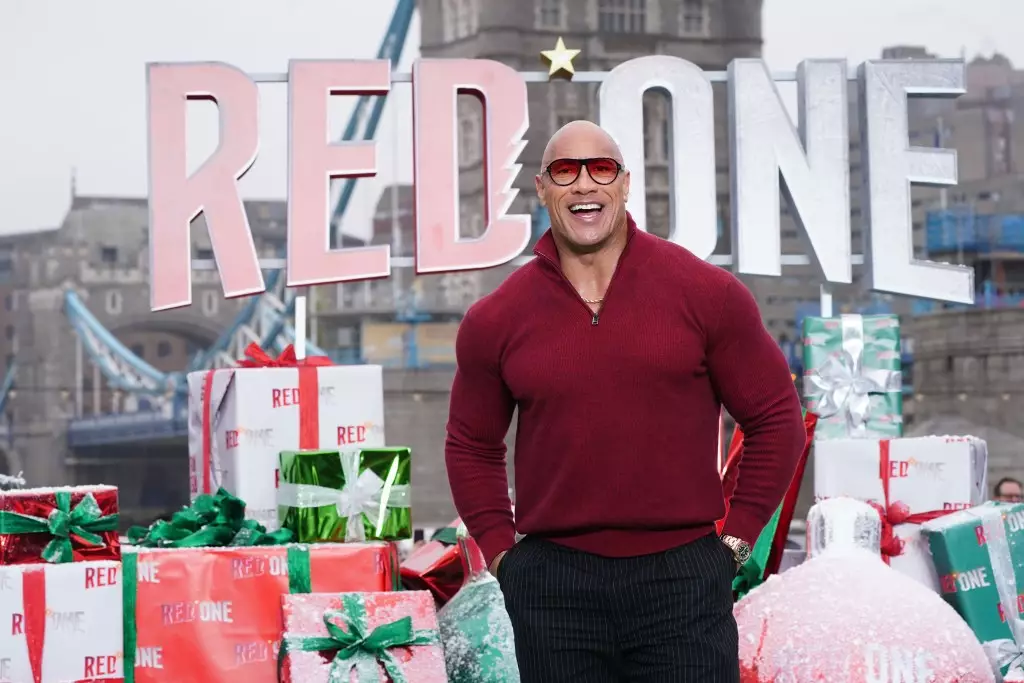The world of Hollywood is not just a realm of glitz and glamour; it is also rife with controversy and sensationalism. Recently, Dwayne “The Rock” Johnson found himself in the eye of a media storm after a report surfaced alleging his frequent tardiness and some unconventional habits while on the set of his upcoming holiday movie, **Red One**. This article delves into the crux of the issue, spotlighting Johnson’s response, the defending voices around him, and what it reveals about the culture within the film industry.
The initial report from The Wrap painted a picture of Johnson as a star who was often late, allegedly pushing the film’s budget into astronomical figures. Specifically, Johnson was cited as being tardy to set by hours at a time, sometimes up to eight, which purportedly contributed to the film’s budget ballooning by $250 million. Upon addressing these claims in a **GQ** cover story, Johnson readily admitted, “Yeah, that happens.” However, he firmly rejected the exaggerated budget implications, dismissing such figures as “bananas” and “crazy,” pushing back against what he termed the “bullshit” surrounding the narrative.
By addressing these claims head-on, Johnson embodies a growing trend among celebrities who are taking control of their narratives in an age of rapid media dissemination and misinformation. The prevailing myth that a star’s schedule should revolve strictly around their commitments rather than their personal routines can often skew public perception and lead to harsh consequences based on misunderstandings.
In the same **GQ** interview, director Jake Kasdan and co-star Chris Evans were quick to offer their defense of Johnson. Kasdan pointed out that Johnson had never missed a day of filming and that the challenges of scheduling and timing are common across the industry. His statement reflects a poignant truth about Hollywood’s working environment: unexpected delays are often woven into the fabric of filmmaking.
Chris Evans went on to emphasize the predictability of Johnson’s schedule, asserting that any perceived tardiness was part of an organized plan known to the entire crew. This suggests that the issues were less about recklessness and more about balancing the rigorous routines actors often maintain, such as extensive workouts or personal commitments, which can lead to slight variances in arrival times.
Beyond the allegorical discussion of tardiness and alleged lifestyle choices, the testimonies from Kasdan and Evans shed light on Johnson’s character. Evans recounted an incident during the filming of **Red One** characterized by an act of generosity that stood in stark contrast to the claims being made about Johnson’s behavior on set. When a raffle intended for the cast and crew was up for grabs, rather than simply allowing it to be a modest affair, Johnson proposed increasing the prize pool from $4,000 to $50,000, an act that demonstrated not only his generosity but also a commitment to the morale of the cast and crew.
This episode encapsulates a critical observation: while celebrity culture often amplifies certain narratives surrounding stars, it frequently oversights their positive contributions and the supportive environments they foster on set. Johnson’s actions display a commitment to uplift those around him, further reinforcing the idea that successful actors can also be community-centric individuals.
The controversy surrounding Dwayne Johnson serves as a reminder of the complex dynamics within Hollywood. It highlights a broader discussion about how public figures are portrayed and how easily misconceptions can take hold. As audiences, we are often quick to judge based on headlines without considering the multifaceted realities that exist behind them. With individuals like Johnson willing to confront these narratives directly, perhaps there is hope for a more nuanced understanding of celebrity life—one that celebrates the individual’s contributions and acknowledges the pressures they face rather than reducing them to mere gossip.
In the end, it’s vital to recognize that the stories we hear are often just a snippet of a much larger narrative, one that could change the way we perceive those who entertain and inspire us.
